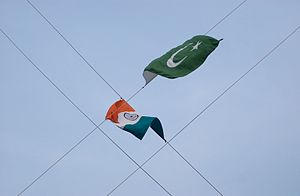Non-Nuclear Aggression Agreement
| Agreement Between India and Pakistan on the Prohibition of Attack against Nuclear Installations and Facilities | |
|---|---|

Flags of India and Pakistan, 2012
|
|
| Type | Strategic Nuclear reduction, control and avoidance of subsequent nuclear conflicts |
| Context | Cold war |
| Drafted | November 30, 1988 (1988-11-30) |
| Signed | December 21, 1988 |
| Location | Islamabad, Pakistan |
| Effective | 1 January 1991 |
| Condition | Ratification of both parties |
| Expiration | Agreement is still in effect |
| Mediators | Science ministries of India and Pakistan |
| Negotiators | Foreign ministries of India and Pakistan |
| Signatories |
Rajiv Gandhi |
| Parties |
|
| Ratifiers |
Parliament of India Parliament of Pakistan |
| Depositary | Governments of Pakistan and India |
| Languages | |
Rajiv Gandhi
(Prime Minister of India)
Benazir Bhutto
(Prime Minister of Pakistan)
The Non-nuclear aggression agreement is a bilateral and nuclear weapons control treaty between the two South Asian states, India and Pakistan, on the reduction (or limitation) of nuclear arms and pledged not to attack or assist foreign powers to attack on each's nuclear installations and facilities. The treaty was drafted in 1988, and signed by the Prime Minister Benazir Bhutto and her Indian counterparts, Rajiv Gandhi on 21 December 1988; it entered into force on January 1991.
The treaty barred its signatories to carry out a surprise attack (or to assist foreign power to attack) on each other's nuclear installations and facilities. The treaty provides a confidence-building security measure environment and refrained each party from "undertaking, encouraging, or participating in,directly or indirectly, any action aimed at causing destruction or damage to any nuclear installation or facility in each country". Starting in January 1992, India and Pakistan have annually exchanged lists of their respective civilian nuclear-related facilities.
In a memoirs written by Pakistani scientist and theorist Munir Ahmad Khan, Pakistan had to be mindful of blatant attack on Pakistan's nuclear installations by its eastern competitor, India. The Israeli Air Force surprise attack (See: Opera) on Iraqi nuclear program had crippled Iraq's nuclear weapons pursuit. Suspicions raised in Pakistan about the parallel attack akin to Opera might be undertaken by Indian Air Force.
...
Wikipedia
